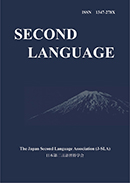Current issue
Displaying 1-15 of 15 articles from this issue
- |<
- <
- 1
- >
- >|
-
2025Volume 24 Pages i-ii
Published: October 31, 2025
Released on J-STAGE: December 27, 2025
Download PDF (358K)
Editor's Note
-
2025Volume 24 Pages 1-2
Published: October 31, 2025
Released on J-STAGE: December 27, 2025
Download PDF (252K)
PART I
SPECIAL CONTRIBUTION FROM J-SLA AUTUMN CONFERENCE 2024
-
2025Volume 24 Pages 3-23
Published: October 31, 2025
Released on J-STAGE: December 27, 2025
Download PDF (1157K)
PART II
CONTRIBUTIONS FROM SYMPOSIUM 1 AT J-SLA 2024
-
2025Volume 24 Pages 24-25
Published: October 31, 2025
Released on J-STAGE: December 27, 2025
Download PDF (230K) -
2025Volume 24 Pages 26-38
Published: October 31, 2025
Released on J-STAGE: December 27, 2025
Download PDF (646K) -
2025Volume 24 Pages 39-50
Published: October 31, 2025
Released on J-STAGE: December 27, 2025
Download PDF (953K) -
2025Volume 24 Pages 51-66
Published: October 31, 2025
Released on J-STAGE: December 27, 2025
Download PDF (990K)
PART III
CONTRIBUTIONS FROM SYMPOSIUM 2 AT J-SLA 2024
-
2025Volume 24 Pages 67-69
Published: October 31, 2025
Released on J-STAGE: December 27, 2025
Download PDF (306K) -
2025Volume 24 Pages 70-83
Published: October 31, 2025
Released on J-STAGE: December 27, 2025
Download PDF (479K) -
2025Volume 24 Pages 84-101
Published: October 31, 2025
Released on J-STAGE: December 27, 2025
Download PDF (643K) -
2025Volume 24 Pages 102-109
Published: October 31, 2025
Released on J-STAGE: December 27, 2025
Download PDF (444K)
PART IV
ARTICLES: SUBMISSION FROM J-SLA INTERNATIONAL CONFERENCE (J-SLA 2024)
-
2025Volume 24 Pages 110-126
Published: October 31, 2025
Released on J-STAGE: December 27, 2025
Download PDF (996K)
PART V
-
2025Volume 24 Pages 127-129
Published: October 31, 2025
Released on J-STAGE: December 27, 2025
Download PDF (292K) -
2025Volume 24 Pages 130
Published: October 31, 2025
Released on J-STAGE: December 27, 2025
Download PDF (237K) -
2025Volume 24 Pages 131-133
Published: October 31, 2025
Released on J-STAGE: December 27, 2025
Download PDF (448K)
- |<
- <
- 1
- >
- >|
